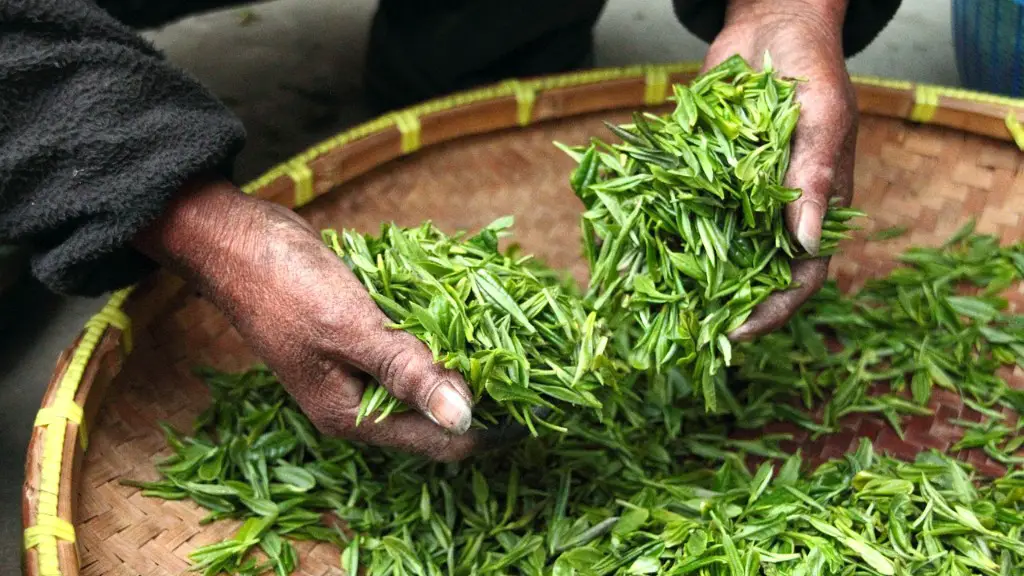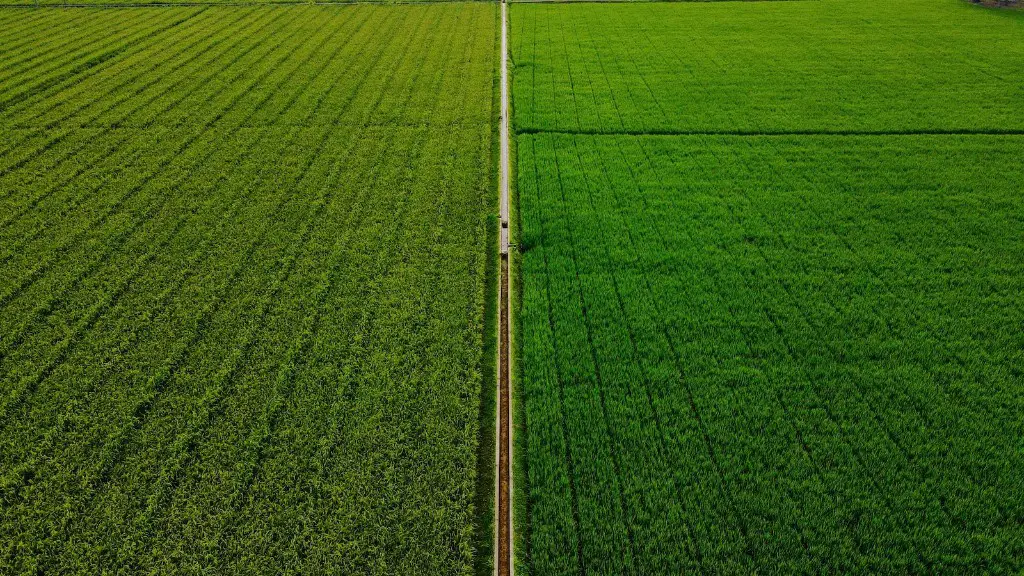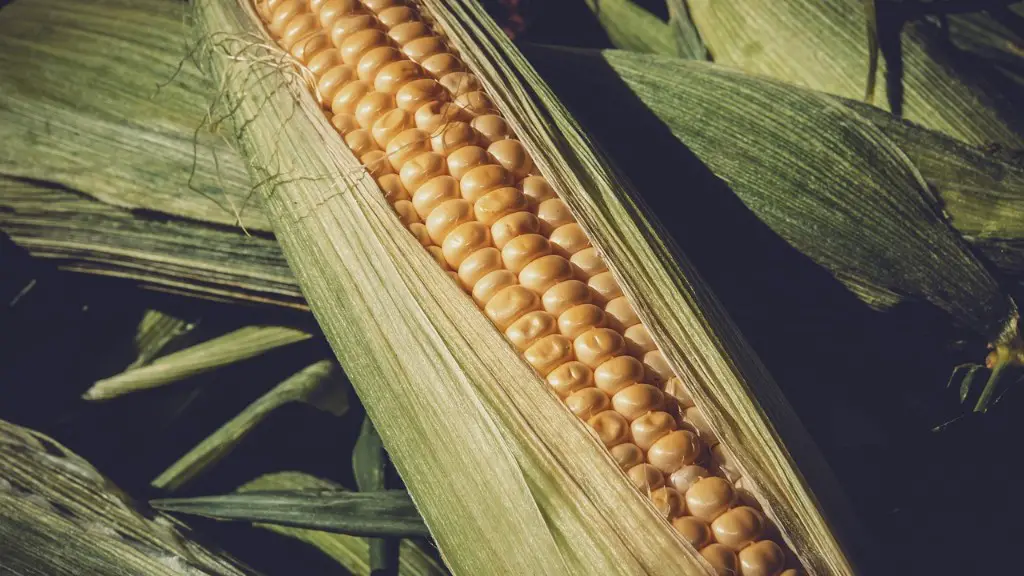Agriculture is an essential part of the US economy. It helps to feed people and create jobs, as well as support natural resources, rural communities, and the environment. The US Department of Agriculture (USDA) has stated that agricultural production accounts for around 9% of Gross Domestic Product (GDP). It is also responsible for roughly 14.7 million jobs and contributes $712 billion to the US economy. So, why is agriculture so important to the US?
The primary purpose of agricultural production in the US is to provide people with food. Americans rely heavily on farm-produced commodities, such as fruits and vegetables, grains, and dairy products. According to the USDA, the largest contributing crop is corn, followed by soybeans, wheat, hay, and cotton. Furthermore, the US government also helps Americans access these products through the Supplemental Nutrition Assistance Program (SNAP), commonly known as food stamps. This program provides SNAP recipients with the ability to purchase food items at participating retailers.
In addition to providing food, agriculture supports natural resources, rural communities, and the environment. US farmers
use sustainable farming practices, such as cover cropping, no-till agriculture, integrated pest management, and manure management, to protect resources. These practices also help to reduce soil erosion, conserve water, and promote biodiversity. Furthermore, agricultural production helps to support rural economies by providing jobs, such as food production workers, farm laborers, and agribusiness professionals.
Another important aspect of US agriculture is its ability to support the environment. US farmers help to mitigate the effects of climate change by using renewable energy sources, such as solar and wind, to power farms. They also help to reduce greenhouse gas emissions through the use of practices, such as no-till agriculture and rotational grazing. Additionally, US agriculture contributes to conservation efforts, such as the restoration of wetlands and habitats that support wildlife.
Ultimately, agriculture is essential to the US economy, providing food, jobs, and supporting natural resources and the environment. US farmers work tirelessly to produce food and to protect the environment, and their efforts should not go unnoticed or unappreciated. By investing in agricultural research, providing competitive markets, and making sure that policies support agricultural producers, the US can ensure that it’s continuing to provide a safe, nutritious, and affordable food supply for its citizens.
Economic Benefits of US Agriculture
Agriculture is central to the US economy, providing billions of dollars in Gross Domestic Product, jobs, and other benefits. According to the USDA, American agricultural production contributed $167.2 billion to the US economy in 2019 alone. The sector also generated 14.7 million jobs and supports a vibrant farm-to-table movement and local food industry in the US, including the craft brewing and distilling industries. An increase in federal funding for agriculture research could drive continued growth in the industry, bringing in more jobs and other economic benefits.
US agriculture is especially beneficial for small farmers, as well as farmworker communities, who are key contributors to the US agricultural sector. Small farms accounted for more than 85 percent of US farms in 2019, and more than half of farmworkers across the US are immigrants. This has led to an increase in rural economic development and an infusion of workers with various cultural backgrounds, helping to enrich communities across the US.
US agriculture has also bolstered trade and export markets. In 2019, exports of US farm products totaled $136.3 billion and exports of food and other agricultural products in 2020 totaled $140.5 billion. The US is a major exporter of food, with exports to 169 countries, and it plays an important role in helping to feed the world. By bolstering exports and increasing investments in agricultural research, the US can continue to contribute to a strong and vibrant global food system.
The US agricultural sector benefits the entire country, providing food, jobs, and economic benefits. With an increased focus on research and support for farmers, the US can continue to benefit from the sector and strengthen its position in global trade markets.
Environmental Benefits of US Agriculture
US agriculture is not just beneficial for the US economy; it is also beneficial for the environment. US farmers have adopted sustainable practices, such as cover cropping and no-till agriculture, that help to preserve natural resources and reduce greenhouse gas emissions. This has led to an increase in biodiversity in natural environments, as well as cleaner water and air.
US agriculture has also played an important role in promoting wildlife conservation. Farms provide habitats for native wildlife, and several US states have established wildlife conservation plans to help protect species. For instance, the US Department of Agriculture’s (USDA) Wildlife Services program collaborates with farmers to provide assistance in managing conflicts between wildlife and livestock or crops. The USDA also works with farmers to promote sustainable land management and conservation efforts, such as restoring wetlands.
The US is also a major contributor to global food security, providing food not just for itself, but for many other countries around the world. Through trade agreements, the US government helps farmers export products to 169 countries, providing food sources and stability in many countries. Additionally, US agricultural research plays an important role in providing disease-resistant crops and developing more efficient production methods that can help conserve resources.
Overall, US agriculture provides environmental benefits, such as cleaner air, water, and wildlife habitats, in addition to contributing to global food security and trade. Through continued research and support for farmers, the US can help ensure that it continues to play an important role in environmental conservation and sustainability.
Social Benefits of US Agriculture
US agriculture provides a variety of social benefits. Agricultural production helps to support rural areas and small businesses, while providing jobs and educational opportunities in the US. Additionally, US farmers help to strengthen communities by providing food and creating local amenities, such as farmers’ markets and farm-to-table restaurants.
US agricultural production also has positive impacts on public health. Access to fresh fruits and vegetables can help to reduce chronic diseases and improve diet quality, while locally grown food helps to decrease food miles and promote sustainability. Furthermore, local food systems also help to reduce food insecurity, which is an important issue in parts of the US.
US agricultural production also helps to provide educational opportunities for individuals. Many of the country’s top universities have research and outreach programs dedicated to agricultural studies, and public schools across the US incorporate agricultural curricula into their classrooms. Furthermore, the USDA’s National Institute of Food and Agriculture provides grants for agricultural research and supports extension programs, which help to bring research-backed resources and knowledge to farmers, consumers, and communities.
Ultimately, US agriculture is a vital source of social benefits. The sector provides social and economic opportunities for rural communities, as well as public health benefits and educational opportunities for individuals. By focusing on research and collaboration between farmers and consumers, the US can continue to provide these important social benefits.
Political Benefits of US Agriculture
US agriculture also has numerous political benefits. US farmers help to provide food security, ensuring that Americans have access to safe, nutritious, and affordable food. Additionally, US farmers produce a range of commodities that are used to make fuel, clothing, and other materials, supporting related industries.
US agricultural production also supports trade agreements and helps to boost exports. US agricultural exports totaled $136.3 billion in 2019, representing 15 percent of total US exports. These exports help to create jobs in the agricultural sector, as well as in related industries, such as transportation and production. The US also helps to feed people around the world, providing food supplies to 169 countries.
Furthermore, US agricultural production helps to support national security. According to the National Intelligence Council, the US reliance on imports of certain commodities could make it vulnerable to disruption in supply, as well as potential political or economic manipulation of those commodities. By increasing investments in agricultural production, the US can drastically reduce its reliance on imports.
US agriculture is an important source of political benefits, providing food security, economic development, and support for US trade agreements. US policies and investments in the sector help to promote economic and social stability in local, regional, and global arenas.
Legal Benefits of US Agriculture
US agriculture is also an important source of legal benefits. US farmers are subject to a variety of US laws, including environmental regulations, labor laws, and food safety regulations. These laws help to protect US farmers by providing standards for production and working conditions, as well as guidelines for protecting the environment.
US farmers are also subject to trade regulations, which help to protect them from market fluctuations and unfair trade practices. The US also regulates agricultural imports and exports, in order to protect US farmers and consumers. Additionally, the US provides certain protections for farmland, such as the USDA Conservation Reserve Program and the Farmland Protection Program.
These legal protections help to ensure that US agricultural production remains safe and sustainable, while protecting production costs, wages, and the environment. By continuing to invest in and enforce these laws, the US can further protect US farmers and consumers, while promoting a fair and competitive ag industry.
US agricultural regulations also help to protect animal welfare. The US government has developed guidelines for humane animal production practices and provides funding for research into animal welfare issues. Furthermore, the USDA’s Animal and Plant Health Inspection Service works to prevent and control animal and plant pests and diseases, helping to ensure that US farmers can produce safe, quality products.
Ultimately, US agricultural regulation provides many legal benefits. US laws help to protect farmers, consumers, and animals alike, while encouraging safe and sustainable production practices. By continuing to invest in and enforce these laws, the US can ensure that its agricultural sector remains strong and competitive.





